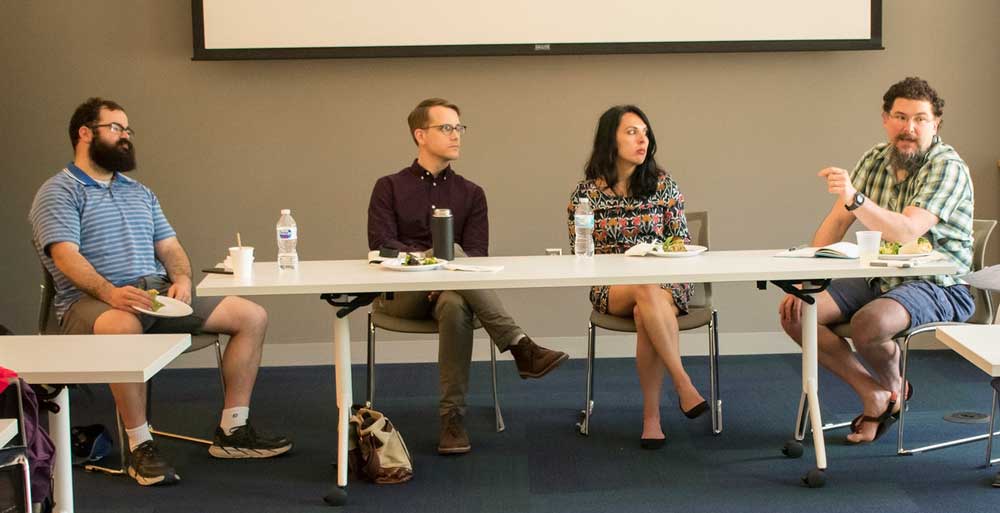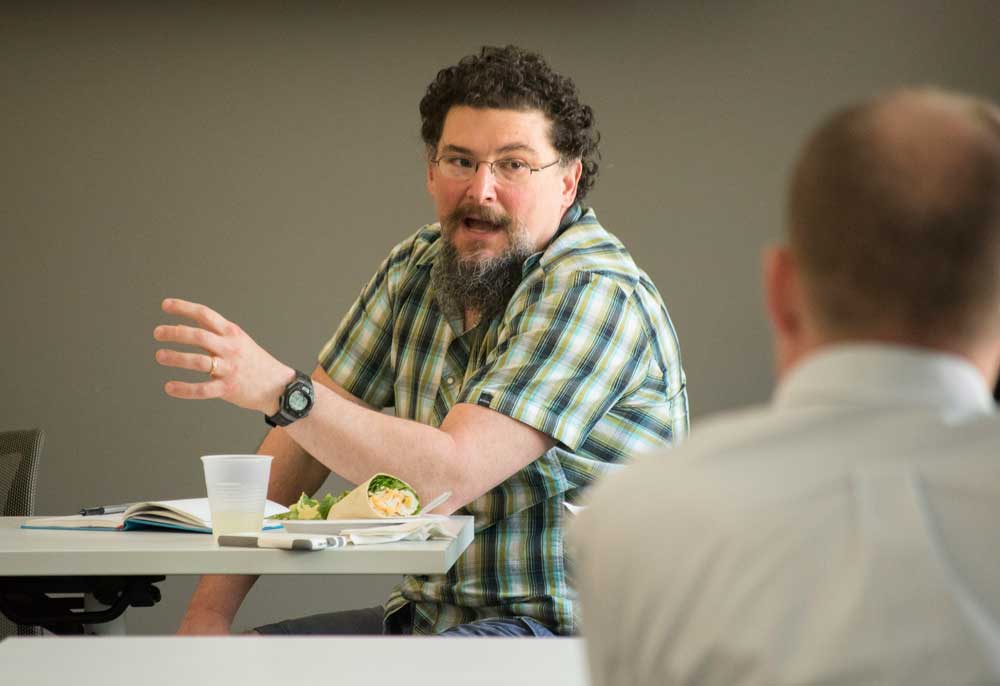By Joshua D. Sosin
Associate Professor of Classical Studies

From left: Recently-defended Ph.D.s John Aldrup-MacDonald (Classical Studies), Matt Omelsky (English), and Laura Banella (Romance Studies) along with Associate Professor Josh Sosin, discuss writing dissertations and advising dissertation writers.
I recently participated in the Versatile Humanists at Duke Summer Writing Kickoff panel, “The Strategic Dissertator” with three sharp, recently defended Ph.D.s: John Aldrup-MacDonald (Classical Studies), Laura Banella (Romance Studies), and Matt Omelsky (English). Together, we provided views on the business of getting the diss done, they as students and I as an advisor. The students did a fantastic job. With that great experience in mind I have assembled here some thoughts on advising dissertators. These are in part an artifact of my discipline, classical studies; they also tilt toward students who aim at academic positions, although recently I have begun to adjust my thinking to consider the full range of professional experiences that Ph.D.s might pursue. I am not sure how strategic my approach is and I know that I can’t match the care, charm, and introspection that the student panelists showed—but here goes.
***
Almost nothing about writing a dissertation is obvious, intuitive, or easy for a first-time author.
So, understand first that there is more than one way to contribute to knowledge; that an advisor should help students develop projects that serve the scholarly community while reflecting and building upon their distinctive strengths. Help students do their part by giving their best.
Advising takes patience, humor, empathy, trust, honesty, lots of talking, and even more listening. The shape, scope, and daily business of advising will differ with student and project, but these fundamentals do not.

Josh Sosin speaking at the panel on dissertations
Advising also takes time. I’ve taught brilliant students, not one of whom was so capable as not to benefit from regular mentoring and discussion. To advise is to make time. Even a lot of time. Even when you are stretched.
Such mentoring can come at the expense of your “own work.” That usually means “scholarship,” but scholarship is by its nature work done for others, for readers whom you do not know, peers who are not yet born, domains that you hadn’t realized intersected with your own. Publications may broadcast more widely and quickly than advising does. But students teach others, who teach others still, and those connections can run as deep and strong as publications do wide. I see advising as my own work, and along with teaching and research all of it belongs to others more than it does to me. Our trade thrives on giving things away.
One of the scholar’s most difficult tasks is maintaining focus on the small detail and big picture at the same time. One student finds her way down in the weeds, another up at 30,000 feet; few can embrace both at once. An advisor must. An advisor keeps a hand on the thread that connects word to sentence to paragraph to chapter to book to discipline, to the history of an idea and its potential in the future—or tries to anyway. Wherever students are most at home, the advisor reminds them constantly that the world of ideas is bigger, messier, and more interconnected than it seems.
In our trade ideas aren’t plucked from the ether. They are sustained by argument. That means architecture. That means design. To arrive at an idea is one thing; to design and construct an argument that allows others to reach the same place requires different skills. Excellence in the former does not guarantee excellence in the latter. Advise accordingly.
Good ideas are born of practice, experience, and hard work. That applies not only to students but to advisors as well. Effective scholars learn how to fall and to recover. Do this in front of a student and she’ll learn it, too.
The process of discovery is not necessarily orderly or efficient. An advisor must help guide students through the mess without sweeping it away for them. Students must prove themselves to themselves.
And that never ends. If you look back on a project without feeling some degree of dissatisfaction you’re either more brilliant and competent than anyone I’ve ever met or you didn’t learn enough about the subject or yourself. Advising is also a project. The goal is not “perfect,” but “better.”
Let mistakes be your friend. They can lead to new questions, new ideas. Let ignorance be your guide. If something does not make sense or smell right, dig deeper, and keep at it until you’ve either learned the sense that it does make or else discovered a problem in need of solution. In advising and research, slow, painstaking improvement is the way we go.
A senior colleague once told me that in his day the dissertation served to demonstrate one’s capacity to do research. It was a swim test, not a qualifying heat. That’s not the case today. For academy-bound students the diss is in effect the first draft of a monograph. I hate that, but it seems to be a fact that is ignored at the student’s peril. So, the stakes are high, which is scary, but the generic norms are well defined—most books look and sound like most other books—which is a help. An advisor helps keep a project in reasonable shape and tune.
Advising is as much about what does not go into the dissertation as it is what does. This is not only because students want to show off all of their discoveries or because the most efficient path is often invisible to a student in the thick of it, but also because an advisor should already have an eye on those first five or six years after the degree, when the new Ph.D. must balance progress on the monograph with the development of side projects that spread one’s name, demonstrate breadth, and provide a productive diversion when a bit of fresh air is needed. An advisor reminds that writing is also a subtractive process. The diss is finished when it has all that it needs and nothing that it doesn’t.
When the diss is done and defended, advisor and advisee are peers, one more experienced, but both travelers in a world whose compass is ordered to knowledge, openness, discovery, and change. But the advisor-advisee relationship does not fall off the map, for the advisor’s duty—to encourage and celebrate, critique and challenge, model and reflect what is good and best—does not die. Over time, though, erstwhile advisees share more of the load.
And none of this necessarily makes immediate or automatic sense, even when a student has read many dissertations, discussed the process, and benefited from input by teachers and peers. A new dissertator doesn’t necessarily know yet where she excels; when to ask for help; how to juggle the little bits and big picture; how to build ideas and guide a reader to them; how to fall down, get back up, and keep moving forward even when visibility is poor; how to get better without getting yourself down; how to shine in a highly conventional guild environment; how to pull back on the reins after years of going all out; and how to transition from advisee to peer.
I sent a draft of these observations to John Aldrup MacDonald, whose excellent dissertation I supervised.
“Too sappy?” I wanted to know.
“No, it sounds like you think advising is teaching. We just don’t call it that. Don’t know why.”
Yeah, what he said.
